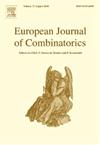Generating functions for fixed points of the Mullineux map
IF 0.9
3区 数学
Q1 MATHEMATICS
引用次数: 0
Abstract
Mullineux defined an involution on the set of -regular partitions of . When is prime, these partitions label irreducible symmetric group modules in characteristic . Mullineux’s conjecture, since proven, was that this “Mullineux map” described the effect on the labels of taking the tensor product with the one-dimensional signature representation. Counting irreducible modules fixed by this tensor product is related to counting irreducible modules for the alternating group in prime characteristic. In 1991, Andrews and Olsson worked out the generating function counting fixed points of Mullineux’s map when is an odd prime (providing evidence in support of Mullineux’s conjecture). In 1998, Bessenrodt and Olsson counted the fixed points in a -block of weight . We extend both results to arbitrary , and determine the corresponding generating functions. When is odd but not prime the extension is immediate, while even requires additional work and the results, which are different, have not appeared in the literature.
穆利纽克斯图定点的生成函数
Mullineux在n的e-正则划分集合上定义了一个对合。当e=p为素数时,这些划分标记了特征为p的不可约对称群模。Mullineux的猜想,自证明以来,是这个“Mullineux映射”描述了用一维签名表示取张量积对标记的影响。计数由该张量积固定的不可约模,涉及到计数交替群An的素特征的不可约模。1991年,Andrews和Olsson在e=p为奇素数时推导出计算Mullineux映射不动点的生成函数(为支持Mullineux猜想提供了证据)。1998年,Bessenrodt和Olsson计算了权重w的p块中的不固定点。我们将这两个结果推广到任意e,并确定了相应的生成函数。当e是奇数但不是素数时,扩展是直接的,而e是偶数则需要额外的工作,并且结果不同,尚未在文献中出现。
本文章由计算机程序翻译,如有差异,请以英文原文为准。
求助全文
约1分钟内获得全文
求助全文
来源期刊
CiteScore
2.10
自引率
10.00%
发文量
124
审稿时长
4-8 weeks
期刊介绍:
The European Journal of Combinatorics is a high standard, international, bimonthly journal of pure mathematics, specializing in theories arising from combinatorial problems. The journal is primarily open to papers dealing with mathematical structures within combinatorics and/or establishing direct links between combinatorics and other branches of mathematics and the theories of computing. The journal includes full-length research papers on important topics.

 求助内容:
求助内容: 应助结果提醒方式:
应助结果提醒方式:


